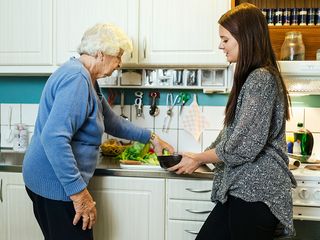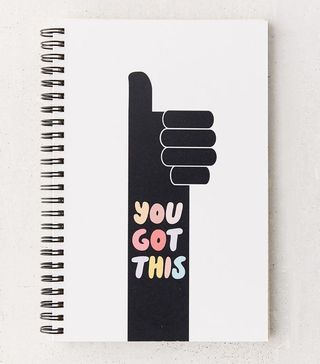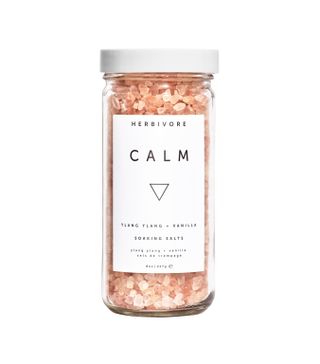12 Things to Do If You're Stressed Out About the Election

Just when you thought the year couldn't get more stressful, we have the 2020 general election to think about. While all elections are important, this one seems even more so. There's a lot on the line here, and because of that, it seems even more fraught. Add to that the COVID-19 pandemic, and we've got a perfect storm of anxiety for everyone.
If you're feeling extremely overwhelmed at the moment, just know you are definitely not alone. "In our world today, we are processing more information than people have ever needed to before," explains Madeleine DiLeonardo, MEd, LPC, NCC, CCATP, a licensed professional counselor and founder of Mind Body and Soul by DiLeonardo Wellness. "With the news cycle, social media, COVID-19, and the most recent election, it makes sense that people are stressed as a result of being inundated with information, navigating the world impacted by COVID, and our current political climate."

So yeah, it's not a great time for the state of your mental health. But what can you do about it? Well, you don't really want to let those stressful, anxious feelings take over. It's going to do a number on your mind and body, and we've still got some time before November 3. It helps to really prioritize taking care of yourself and checking in on those around you as well since they're probably experiencing the same emotions as you right now.
"The enormity of this problem can be really paralyzing," says Emily Anhalt, PsyD, co-founder and chief clinical officer at Coa, a mental health platform that is hosting free political anxiety support sessions in the lead-up to the election. "Everyone's really burned out. We all have apocalypse fatigue. The human brain was only evolved to handle so much tough information at once, and because of the news and social media and how connected we are in that sense, I think we're being bombarded by just more than we know what to do with. One of the things I think is really important is creating a proactive emotional-fitness routine."

That means creating some self-care practices and mindfulness habits and techniques that you can lean on throughout the days and weeks leading up to the election and even beyond that. These tools can stop you from feeling so burnt out and exhausted, and they could even give you more energy to fight for the issues you care about and what you believe in.
To help all of us get started with that, I asked some therapists and mental health experts for coping tips and about how to strengthen our minds right now.
1. Validate Your Feelings

The best way to start is by acknowledging your feelings. Anhalt says normalizing what you're feeling right now is important. It's okay to feel anxious and to worry, not only about the election but about COVID, too. "But I think that sometimes it can be hard to know when the worrying is protecting us and when it's actually getting in the way of us taking care of ourselves," Anhalt says. "So, of course, we need to take proper precautions, but it doesn't mean we should be completely isolating ourselves with no interpersonal activities or dynamics. Definitely keep an eye on when worrying is actually serving you and keeping you safe and when it's getting in the way of living the life that you want to live."
To help manage your emotions, Jordan Madison, LCMFT, creator of Therapy Is My JAM, suggests writing them down or talking them out. "It can also be helpful to remind yourself that your feelings are not facts. While you are allowed to feel however you want, it doesn’t mean the way you feel is always the truth of the situation," she says. "It also might be helpful to seek out a therapist during this time as well, to have someone unbiased to help you process how you’re feeling."
2. Be Aware of Your Stressors

Knowing what really rattles you can help you come up with ways to cope with or tend to your emotions. There are so many triggers because of the sheer number of overwhelming things happening in the world. "There will be added stress, pressure, and emotional fatigue," explains Nina Westbrook, LMFT. "Be on the lookout for any of these feelings and emotions moving forward. They might be a sign that it is time to start subtracting some of the stressors from your life and replacing them with some of the things that bring you back to a place of calm."
3. Manage Expectations

Taking some pressure off yourself can help you cope. It's always important to be kind and patient with yourself, but now, it's needed more than ever. "I think that you can manage your feelings and emotions during this time by managing your expectations and really listening to what it is your body and your mind are telling you they need," Westbrook says. "Knowing that we are navigating through 'uncharted territory' means that we must be open to experiencing things we may not be accustomed to. Being open to new experiences and setting realistic goals for yourself will help you to take charge of your emotional well-being during these tough times."
4. Become Comfortable With Being Uncomfortable

Anhalt believes that mindfulness is about becoming more comfortable with being uncomfortable. "I think that so much of what we do is in service of moving away from discomfort, but then, often the things we do to avoid that discomfort end up being more uncomfortable and worse for us than the original thing we are trying to avoid," she explains. "So, to me, mindfulness is about slowing things down and proving to yourself that you can handle discomfort. You can do hard things—you can survive tough moments."
When practicing mindfulness, build it into your routine. Do things that can help you move through the discomfort and face it head-on, like yoga, meditation, journaling… whatever helps you. Madison adds it can be as simple as paying attention to your surroundings—counting how many things you can see, hear, smell, feel, or taste in the moment to focus on your senses.
5. Don't Doomscroll

Let me repeat that: Don't doomscroll. We're all guilty of it, but where does it get us? I've never ended a doomscrolling session and thought, "Wow, I'm so glad I did that."
Yes, it's so crucial to stay informed, especially in this moment, but there's information overload right now. It's impossible to read every single article out there, and to be honest, it might not even be that helpful for you. Learn how to manage all of that news.
"Choosing one or two trusted media outlets to turn to for updates and news will help you avoid feeling bombarded or overwhelmed by the nonstop flow of information," Westbrook suggests. "Everything is good in moderation, and the news/media is no different. Try to limit your access to the news to specific times of the day or to a certain amount of time per day. This way, it doesn’t become something that you become hyper-focused on."
6. Create News-Free Spaces

Make sure there are moments of the day when you have time to just wind down, set intentions for yourself, or just veg. Madison recommends not reading or watching the news first thing in the morning or right before bed so you're not starting or ending your days on a bad note.
And create these boundaries with your friends and family, too. "One of the things I suggest is to create news-free spaces to connect with friends and loved ones," Anhalt says. "Have Zoom calls where no one's allowed to talk about what's going on and just to connect as people."
7. Trust Your Future Self

As someone who's constantly worrying about every detail of the future—whether it's the state of the world in the next 10 to 25 years or if I'll be able to find a parking spot when I go to the store tomorrow—this idea really resonated with me. If you can't stop worrying about what's going to happen on Election Day and the aftermath and how you're going to cope, there is not much you can do about it right now except vote and put your support behind the causes you believe in. But some things are out of your control.
"We tend to get really preoccupied by things that haven't even happened yet," Anhalt explains. "The problem is the version of you that will deal with the tough things that happen in the future does not exist yet. That version of you will be born into existence when that moment comes. That version of you will have had more time and more experience to figure out what to do. So expecting yourself now to know what to do about something that hasn't even come into fruition yet is unfair."
If you're having a hard time grasping that idea, Anhalt also suggests scheduling time to worry. "If anxiety has kind of permeated your whole day and it's pulling you away from everything you need to do, schedule one hour at some point in the day where all you have to do is worry," she says. "You can ruminate, and you can freak out and have all your feelings, but then, the rest of the day, when you start to worry, you can say, 'You know what? Six o'clock me will worry about that.'"
8. Find Your Community

Because of social-distancing rules and quarantine, this moment can feel so isolating, even with social media. Anhalt recommends finding a community and creating a safe space to talk about your feelings and what you're going through. And that doesn't mean it's going to turn into a pity party—you should also allow yourself to look for moments of joy. While it may be hard to find these moments or feel happy when so many people are suffering right now, finding a balance can help. Identify the things that make you happy and grateful.
9. Check In With Family and Friends

Keep in touch with your loved ones because they might be going through the same things you're going through right now. "Often in our busy lives, we think of people but then don't actually reach out or express how we are feeling to others," DiLeonardo says. "Sending a quick text to let someone know you are thinking of them or scheduling a phone call and offering availability for someone to vent or express how they feel can be very valuable."
10. Be Mindful When Interacting With Others

On the other end of all of this is the truth that interactions with others (with people you know or strangers) can feel strained right now. Emotions are high. People may have different opinions or perspectives. It can get heated.
Westbrook suggests approaching conversations and interactions with an open mind and a listening ear. "It's important to remember that people are doing their best to manage and cope with their feelings and beliefs, just like you are," she explains. "By no account does this mean that you must let others 'walk all over you,' but it just means that this is a great time to extend a little more grace to yourself and others."
Differing opinions can mean a lot nowadays. If someone disagrees with you, it's up to you to decide how you want to proceed. "At this time in life, there are some big-ticket items on the line this election. If someone doesn't agree with women's rights or Black Lives Matter and you identify as those groups, it may feel that they don't respect you as a person, and it may be more difficult to communicate," Madison says. "I wouldn't suggest refraining from all conversations that may cause disagreements because it may be helpful to know where your family and friends stand on big topics that are important to you. However, once you know where they stand, it is up to you to decide how to interact with them and manage your peace at the same time."
11. Be Proactive

If you're feeling anxious about the outcome, you can focus on the things you can control. One person might not be able to sway the entire Electoral College, but you do have the power to effect some change. This will help you prepare your coping mechanisms for post-election, no matter how things go, says Westbrook. "Whether it's voting, volunteering, or outreach, knowing that you put your best foot forward holds power. This way, you know you did your part, regardless of the outcome," she explains. "You can feel good about your own actions while keeping in mind that life will go on. Just like any other disappointment we experience throughout our lives, we push forward and remind ourselves that we have the ability to control the way we process each of these events taking place in our lives."
12. Try to Let Go of Anxiety

This is easier said than done, especially on Election Day. But on November 3, make sure you schedule some time to do things that make you feel good. "There are times when we feel so entwined with our political beliefs that we forget that there is so much more to who we are and what we can do to make this world a better place," Westbrook says. "Vote so that your voice can be heard, but once that ballot is cast, it's time to release any anxiety that may surround the outcome. It is officially out of our hands at that point, and it becomes time to focus on the good. Engage in activities that make you feel calm—you could read a book, take a bath, or take a walk. Perhaps, you could avoid TV and social media, as the intense energy and hyped-up back-and-forth on those platforms can become exhausting. Distraction isn't always the best technique, but in this case, it works!"
Disclaimer
This article is provided for informational purposes only and is not intended to be used in the place of advice of your physician or other medical professionals. You should always consult with your doctor or healthcare provider first with any health-related questions.
Sarah is lifestyle writer and editor with over 10 years of experience covering health and wellness, interior design, food, beauty, and tech. Born and raised in Los Angeles, she attended New York University and lived in New York for 12 years before returning to L.A. in 2019.
In addition to her work on THE/THIRTY and Who What Wear, she held editor roles at Apartment Therapy, Real Simple, House Beautiful, Elle Decor, and The Bump (sister site of The Knot).
She has a passion for health and wellness, but she especially loves writing about mental health. Her self-care routine consists of five things: a good workout, “me” time on the regular, an intriguing book/podcast/playlist to unwind after a long day, naps, and decorating her home.
-
 I Live for Yoga and Pilates—These Are the Pieces That Help My Flow
I Live for Yoga and Pilates—These Are the Pieces That Help My FlowTake notes.
By Humaa Hussain
-
 It's Time to Get Our Nutrition in Check for Summer—This App Is Making It Easy
It's Time to Get Our Nutrition in Check for Summer—This App Is Making It EasyThe recipe ideas are endless.
By Who What Wear
-
 This Founder Shares Why We Should Start Celebrating Rest
This Founder Shares Why We Should Start Celebrating RestBurnout is nothing to be proud of.
By Kia Topps
-
 If You're Battling With Digestive Issues, This Could Be Why
If You're Battling With Digestive Issues, This Could Be WhyTurns out, you may not have IBS after all.
By Kia Topps
-
 Our Editors Own a Lot of Sneakers, But This Pair Comes in First Place Every Time
Our Editors Own a Lot of Sneakers, But This Pair Comes in First Place Every TimeA major win.
By Aniyah Morinia
-
 Why Dr. Deepika Chopra Believes that Optimism is Resiliency
Why Dr. Deepika Chopra Believes that Optimism is ResiliencyWhy you should start embracing every feeling.
By Kia Topps
-
 How TikTok's Favorite Photographer Helped Me Find My Confidence
How TikTok's Favorite Photographer Helped Me Find My ConfidenceI renewed my relationship with myself.
By MacKenzie Green
-
 I Changed My Mind About Strength Training When I Tried This Workout
I Changed My Mind About Strength Training When I Tried This WorkoutMy confidence is officially on 10.
By Kia Topps





